Global Economic Implications of Greece's Exit from Eurozone in 2016
VerifiedAdded on 2023/01/10
|11
|4175
|93
AI Summary
This essay analyzes the economic implications of Greece's exit from the Eurozone in 2016 and examines the economic policies used to address Greece's macroeconomic issues. It also explores the policy decisions made by Greece since 1973 that contributed to the sovereign debt crisis in 2010.
Contribute Materials
Your contribution can guide someone’s learning journey. Share your
documents today.
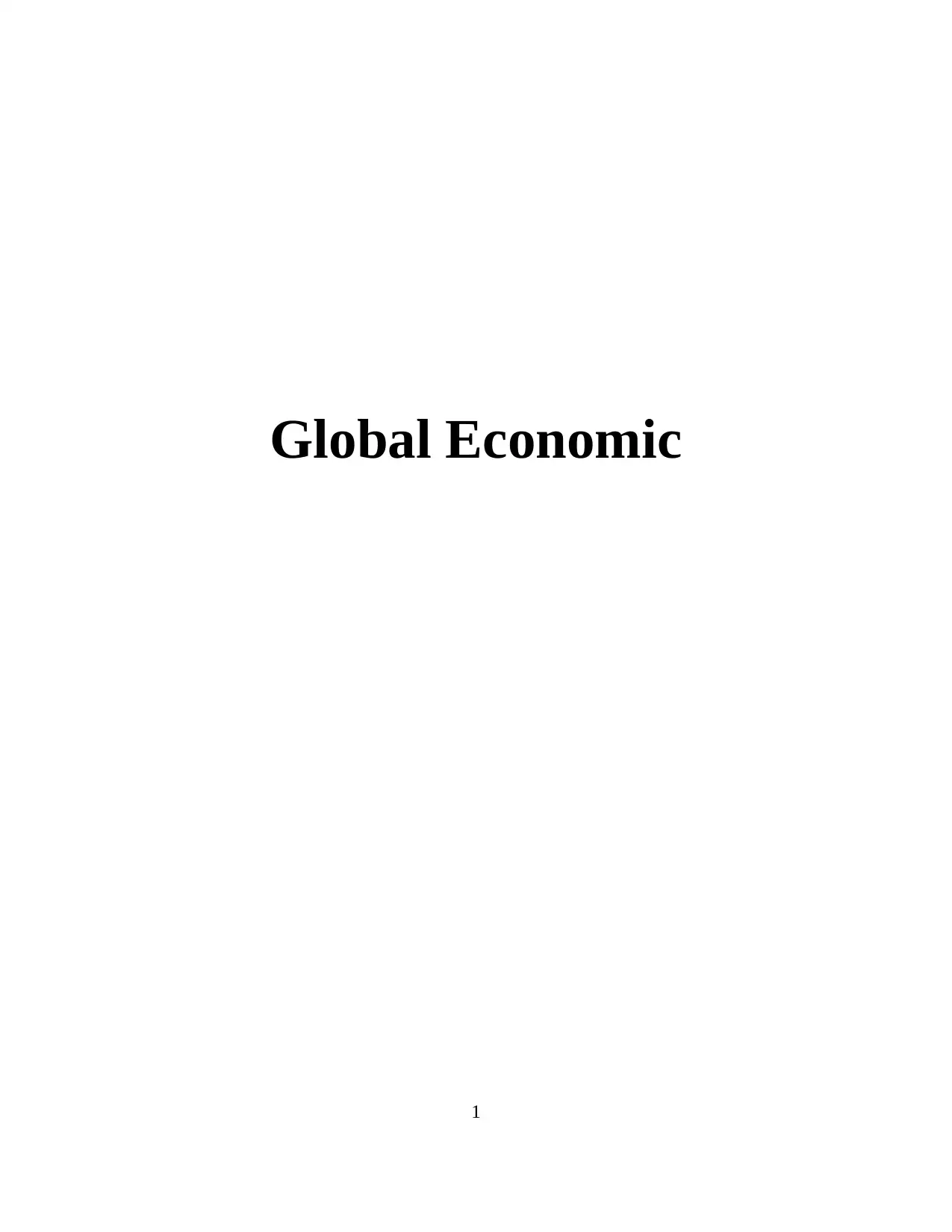
Global Economic
1
1
Secure Best Marks with AI Grader
Need help grading? Try our AI Grader for instant feedback on your assignments.
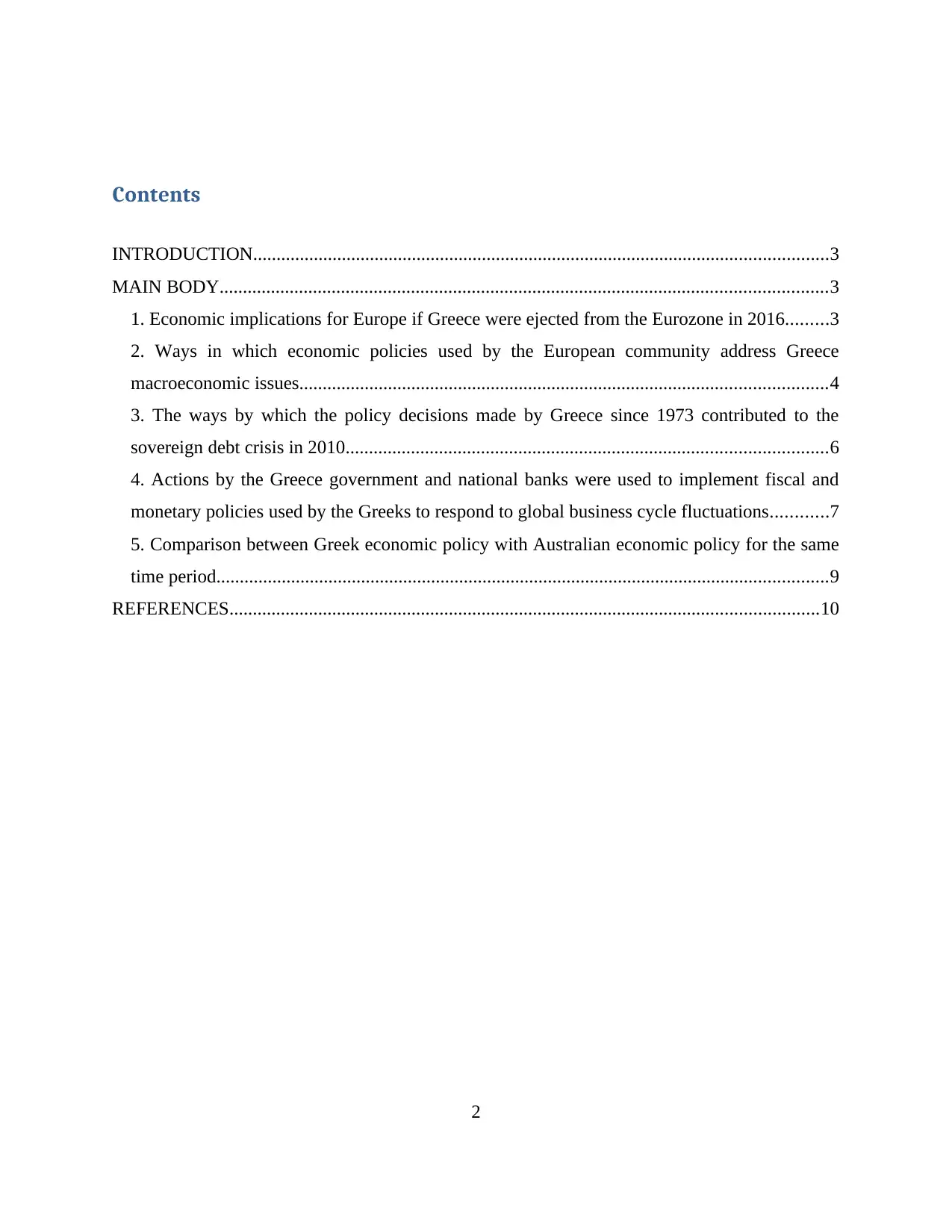
Contents
INTRODUCTION...........................................................................................................................3
MAIN BODY..................................................................................................................................3
1. Economic implications for Europe if Greece were ejected from the Eurozone in 2016.........3
2. Ways in which economic policies used by the European community address Greece
macroeconomic issues.................................................................................................................4
3. The ways by which the policy decisions made by Greece since 1973 contributed to the
sovereign debt crisis in 2010.......................................................................................................6
4. Actions by the Greece government and national banks were used to implement fiscal and
monetary policies used by the Greeks to respond to global business cycle fluctuations............7
5. Comparison between Greek economic policy with Australian economic policy for the same
time period...................................................................................................................................9
REFERENCES..............................................................................................................................10
2
INTRODUCTION...........................................................................................................................3
MAIN BODY..................................................................................................................................3
1. Economic implications for Europe if Greece were ejected from the Eurozone in 2016.........3
2. Ways in which economic policies used by the European community address Greece
macroeconomic issues.................................................................................................................4
3. The ways by which the policy decisions made by Greece since 1973 contributed to the
sovereign debt crisis in 2010.......................................................................................................6
4. Actions by the Greece government and national banks were used to implement fiscal and
monetary policies used by the Greeks to respond to global business cycle fluctuations............7
5. Comparison between Greek economic policy with Australian economic policy for the same
time period...................................................................................................................................9
REFERENCES..............................................................................................................................10
2
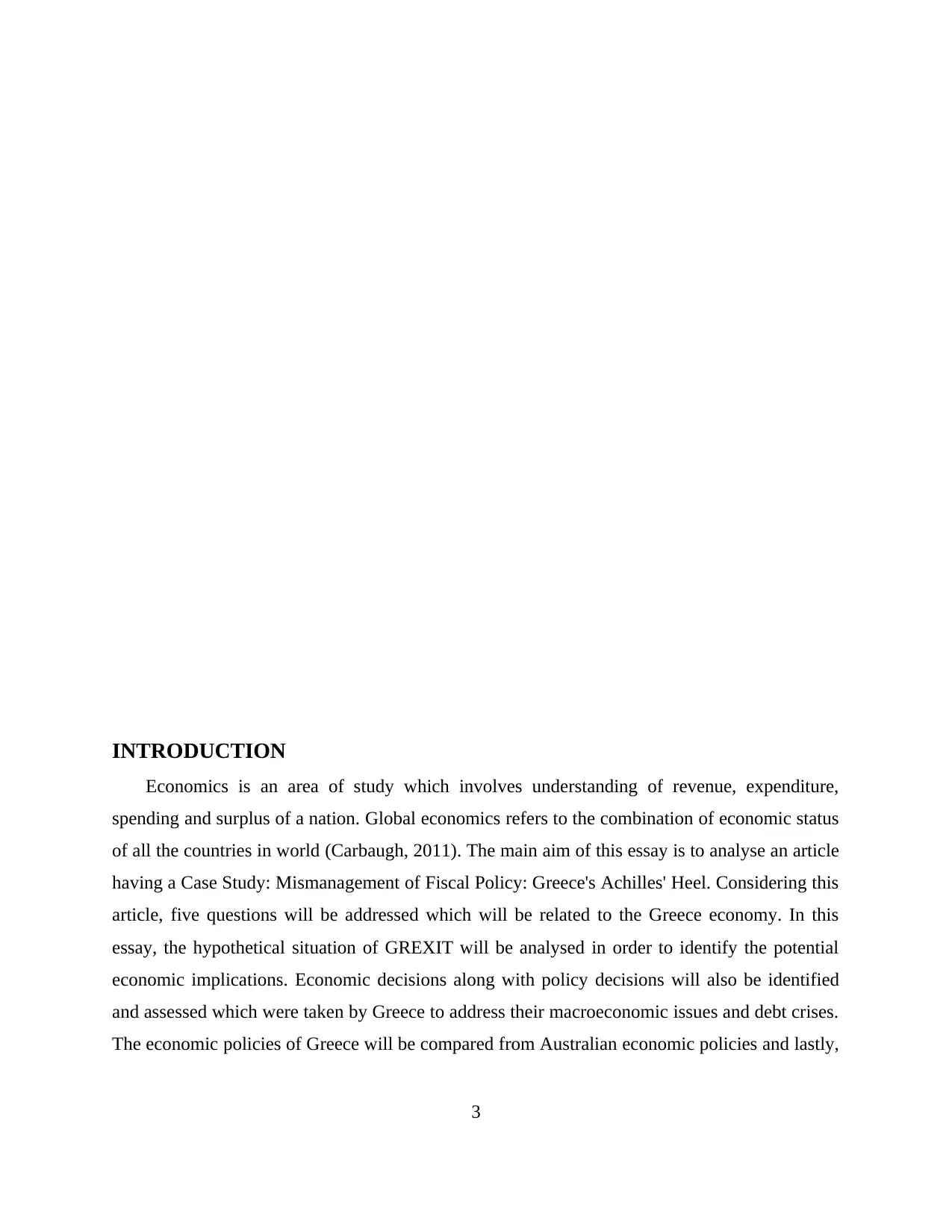
INTRODUCTION
Economics is an area of study which involves understanding of revenue, expenditure,
spending and surplus of a nation. Global economics refers to the combination of economic status
of all the countries in world (Carbaugh, 2011). The main aim of this essay is to analyse an article
having a Case Study: Mismanagement of Fiscal Policy: Greece's Achilles' Heel. Considering this
article, five questions will be addressed which will be related to the Greece economy. In this
essay, the hypothetical situation of GREXIT will be analysed in order to identify the potential
economic implications. Economic decisions along with policy decisions will also be identified
and assessed which were taken by Greece to address their macroeconomic issues and debt crises.
The economic policies of Greece will be compared from Australian economic policies and lastly,
3
Economics is an area of study which involves understanding of revenue, expenditure,
spending and surplus of a nation. Global economics refers to the combination of economic status
of all the countries in world (Carbaugh, 2011). The main aim of this essay is to analyse an article
having a Case Study: Mismanagement of Fiscal Policy: Greece's Achilles' Heel. Considering this
article, five questions will be addressed which will be related to the Greece economy. In this
essay, the hypothetical situation of GREXIT will be analysed in order to identify the potential
economic implications. Economic decisions along with policy decisions will also be identified
and assessed which were taken by Greece to address their macroeconomic issues and debt crises.
The economic policies of Greece will be compared from Australian economic policies and lastly,
3
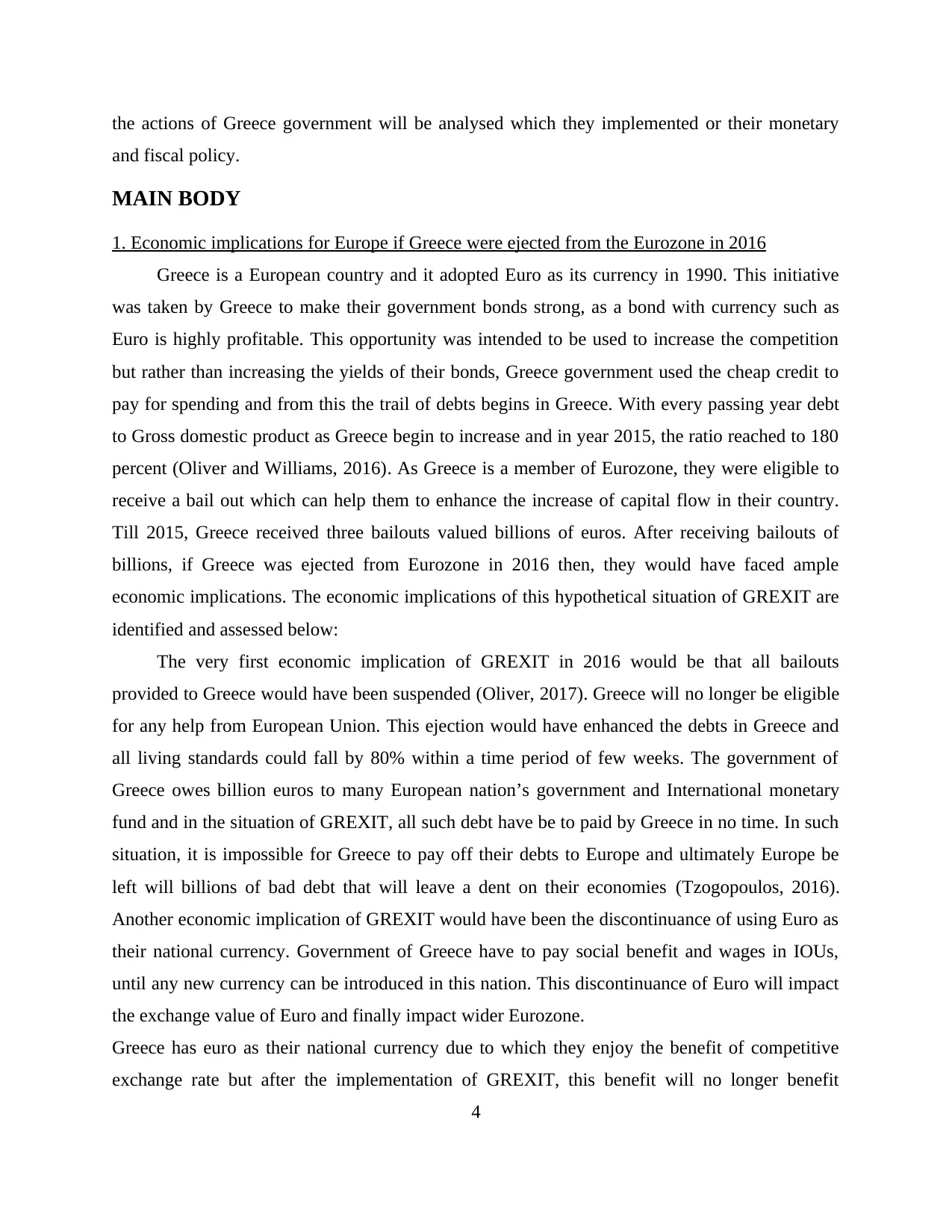
the actions of Greece government will be analysed which they implemented or their monetary
and fiscal policy.
MAIN BODY
1. Economic implications for Europe if Greece were ejected from the Eurozone in 2016
Greece is a European country and it adopted Euro as its currency in 1990. This initiative
was taken by Greece to make their government bonds strong, as a bond with currency such as
Euro is highly profitable. This opportunity was intended to be used to increase the competition
but rather than increasing the yields of their bonds, Greece government used the cheap credit to
pay for spending and from this the trail of debts begins in Greece. With every passing year debt
to Gross domestic product as Greece begin to increase and in year 2015, the ratio reached to 180
percent (Oliver and Williams, 2016). As Greece is a member of Eurozone, they were eligible to
receive a bail out which can help them to enhance the increase of capital flow in their country.
Till 2015, Greece received three bailouts valued billions of euros. After receiving bailouts of
billions, if Greece was ejected from Eurozone in 2016 then, they would have faced ample
economic implications. The economic implications of this hypothetical situation of GREXIT are
identified and assessed below:
The very first economic implication of GREXIT in 2016 would be that all bailouts
provided to Greece would have been suspended (Oliver, 2017). Greece will no longer be eligible
for any help from European Union. This ejection would have enhanced the debts in Greece and
all living standards could fall by 80% within a time period of few weeks. The government of
Greece owes billion euros to many European nation’s government and International monetary
fund and in the situation of GREXIT, all such debt have be to paid by Greece in no time. In such
situation, it is impossible for Greece to pay off their debts to Europe and ultimately Europe be
left will billions of bad debt that will leave a dent on their economies (Tzogopoulos, 2016).
Another economic implication of GREXIT would have been the discontinuance of using Euro as
their national currency. Government of Greece have to pay social benefit and wages in IOUs,
until any new currency can be introduced in this nation. This discontinuance of Euro will impact
the exchange value of Euro and finally impact wider Eurozone.
Greece has euro as their national currency due to which they enjoy the benefit of competitive
exchange rate but after the implementation of GREXIT, this benefit will no longer benefit
4
and fiscal policy.
MAIN BODY
1. Economic implications for Europe if Greece were ejected from the Eurozone in 2016
Greece is a European country and it adopted Euro as its currency in 1990. This initiative
was taken by Greece to make their government bonds strong, as a bond with currency such as
Euro is highly profitable. This opportunity was intended to be used to increase the competition
but rather than increasing the yields of their bonds, Greece government used the cheap credit to
pay for spending and from this the trail of debts begins in Greece. With every passing year debt
to Gross domestic product as Greece begin to increase and in year 2015, the ratio reached to 180
percent (Oliver and Williams, 2016). As Greece is a member of Eurozone, they were eligible to
receive a bail out which can help them to enhance the increase of capital flow in their country.
Till 2015, Greece received three bailouts valued billions of euros. After receiving bailouts of
billions, if Greece was ejected from Eurozone in 2016 then, they would have faced ample
economic implications. The economic implications of this hypothetical situation of GREXIT are
identified and assessed below:
The very first economic implication of GREXIT in 2016 would be that all bailouts
provided to Greece would have been suspended (Oliver, 2017). Greece will no longer be eligible
for any help from European Union. This ejection would have enhanced the debts in Greece and
all living standards could fall by 80% within a time period of few weeks. The government of
Greece owes billion euros to many European nation’s government and International monetary
fund and in the situation of GREXIT, all such debt have be to paid by Greece in no time. In such
situation, it is impossible for Greece to pay off their debts to Europe and ultimately Europe be
left will billions of bad debt that will leave a dent on their economies (Tzogopoulos, 2016).
Another economic implication of GREXIT would have been the discontinuance of using Euro as
their national currency. Government of Greece have to pay social benefit and wages in IOUs,
until any new currency can be introduced in this nation. This discontinuance of Euro will impact
the exchange value of Euro and finally impact wider Eurozone.
Greece has euro as their national currency due to which they enjoy the benefit of competitive
exchange rate but after the implementation of GREXIT, this benefit will no longer benefit
4
Secure Best Marks with AI Grader
Need help grading? Try our AI Grader for instant feedback on your assignments.
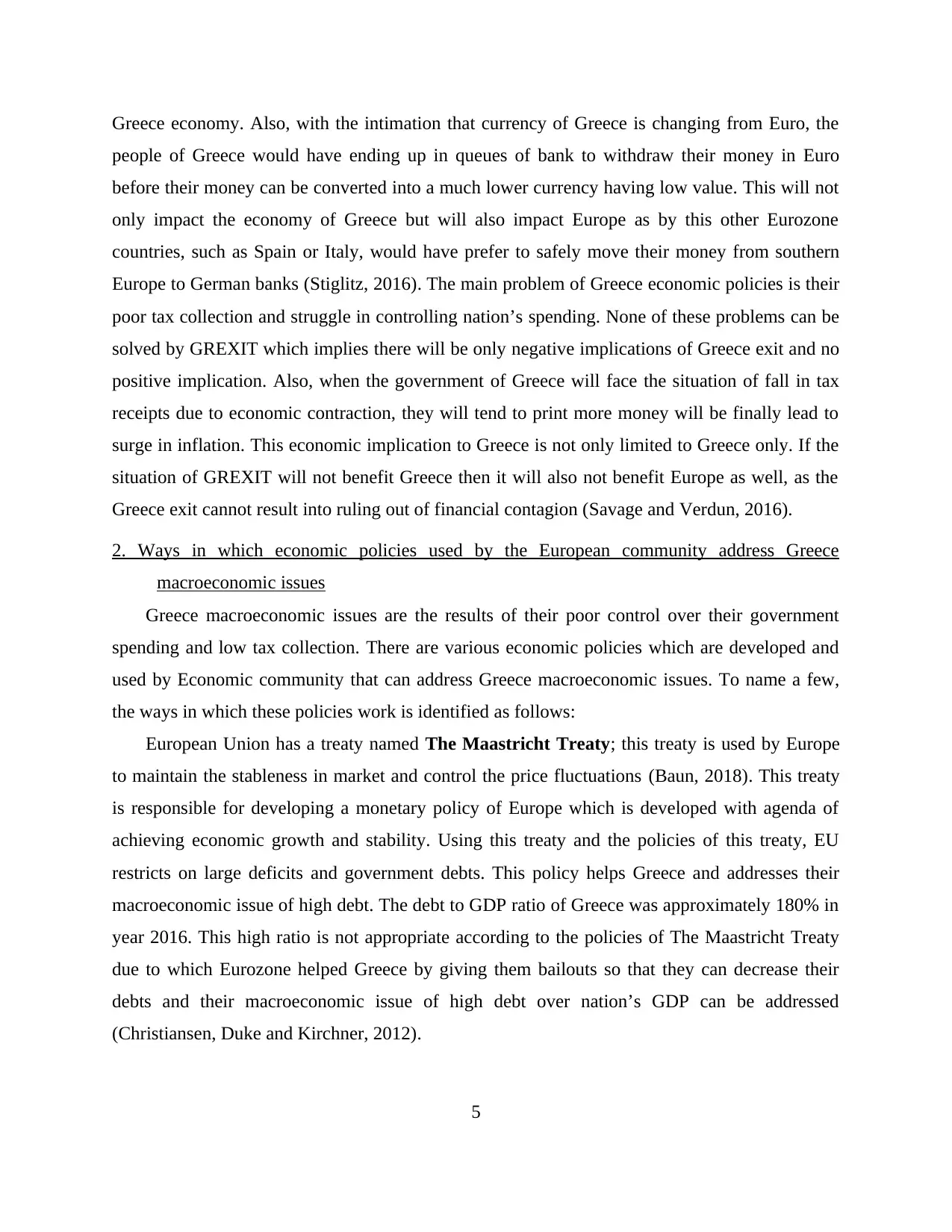
Greece economy. Also, with the intimation that currency of Greece is changing from Euro, the
people of Greece would have ending up in queues of bank to withdraw their money in Euro
before their money can be converted into a much lower currency having low value. This will not
only impact the economy of Greece but will also impact Europe as by this other Eurozone
countries, such as Spain or Italy, would have prefer to safely move their money from southern
Europe to German banks (Stiglitz, 2016). The main problem of Greece economic policies is their
poor tax collection and struggle in controlling nation’s spending. None of these problems can be
solved by GREXIT which implies there will be only negative implications of Greece exit and no
positive implication. Also, when the government of Greece will face the situation of fall in tax
receipts due to economic contraction, they will tend to print more money will be finally lead to
surge in inflation. This economic implication to Greece is not only limited to Greece only. If the
situation of GREXIT will not benefit Greece then it will also not benefit Europe as well, as the
Greece exit cannot result into ruling out of financial contagion (Savage and Verdun, 2016).
2. Ways in which economic policies used by the European community address Greece
macroeconomic issues
Greece macroeconomic issues are the results of their poor control over their government
spending and low tax collection. There are various economic policies which are developed and
used by Economic community that can address Greece macroeconomic issues. To name a few,
the ways in which these policies work is identified as follows:
European Union has a treaty named The Maastricht Treaty; this treaty is used by Europe
to maintain the stableness in market and control the price fluctuations (Baun, 2018). This treaty
is responsible for developing a monetary policy of Europe which is developed with agenda of
achieving economic growth and stability. Using this treaty and the policies of this treaty, EU
restricts on large deficits and government debts. This policy helps Greece and addresses their
macroeconomic issue of high debt. The debt to GDP ratio of Greece was approximately 180% in
year 2016. This high ratio is not appropriate according to the policies of The Maastricht Treaty
due to which Eurozone helped Greece by giving them bailouts so that they can decrease their
debts and their macroeconomic issue of high debt over nation’s GDP can be addressed
(Christiansen, Duke and Kirchner, 2012).
5
people of Greece would have ending up in queues of bank to withdraw their money in Euro
before their money can be converted into a much lower currency having low value. This will not
only impact the economy of Greece but will also impact Europe as by this other Eurozone
countries, such as Spain or Italy, would have prefer to safely move their money from southern
Europe to German banks (Stiglitz, 2016). The main problem of Greece economic policies is their
poor tax collection and struggle in controlling nation’s spending. None of these problems can be
solved by GREXIT which implies there will be only negative implications of Greece exit and no
positive implication. Also, when the government of Greece will face the situation of fall in tax
receipts due to economic contraction, they will tend to print more money will be finally lead to
surge in inflation. This economic implication to Greece is not only limited to Greece only. If the
situation of GREXIT will not benefit Greece then it will also not benefit Europe as well, as the
Greece exit cannot result into ruling out of financial contagion (Savage and Verdun, 2016).
2. Ways in which economic policies used by the European community address Greece
macroeconomic issues
Greece macroeconomic issues are the results of their poor control over their government
spending and low tax collection. There are various economic policies which are developed and
used by Economic community that can address Greece macroeconomic issues. To name a few,
the ways in which these policies work is identified as follows:
European Union has a treaty named The Maastricht Treaty; this treaty is used by Europe
to maintain the stableness in market and control the price fluctuations (Baun, 2018). This treaty
is responsible for developing a monetary policy of Europe which is developed with agenda of
achieving economic growth and stability. Using this treaty and the policies of this treaty, EU
restricts on large deficits and government debts. This policy helps Greece and addresses their
macroeconomic issue of high debt. The debt to GDP ratio of Greece was approximately 180% in
year 2016. This high ratio is not appropriate according to the policies of The Maastricht Treaty
due to which Eurozone helped Greece by giving them bailouts so that they can decrease their
debts and their macroeconomic issue of high debt over nation’s GDP can be addressed
(Christiansen, Duke and Kirchner, 2012).
5
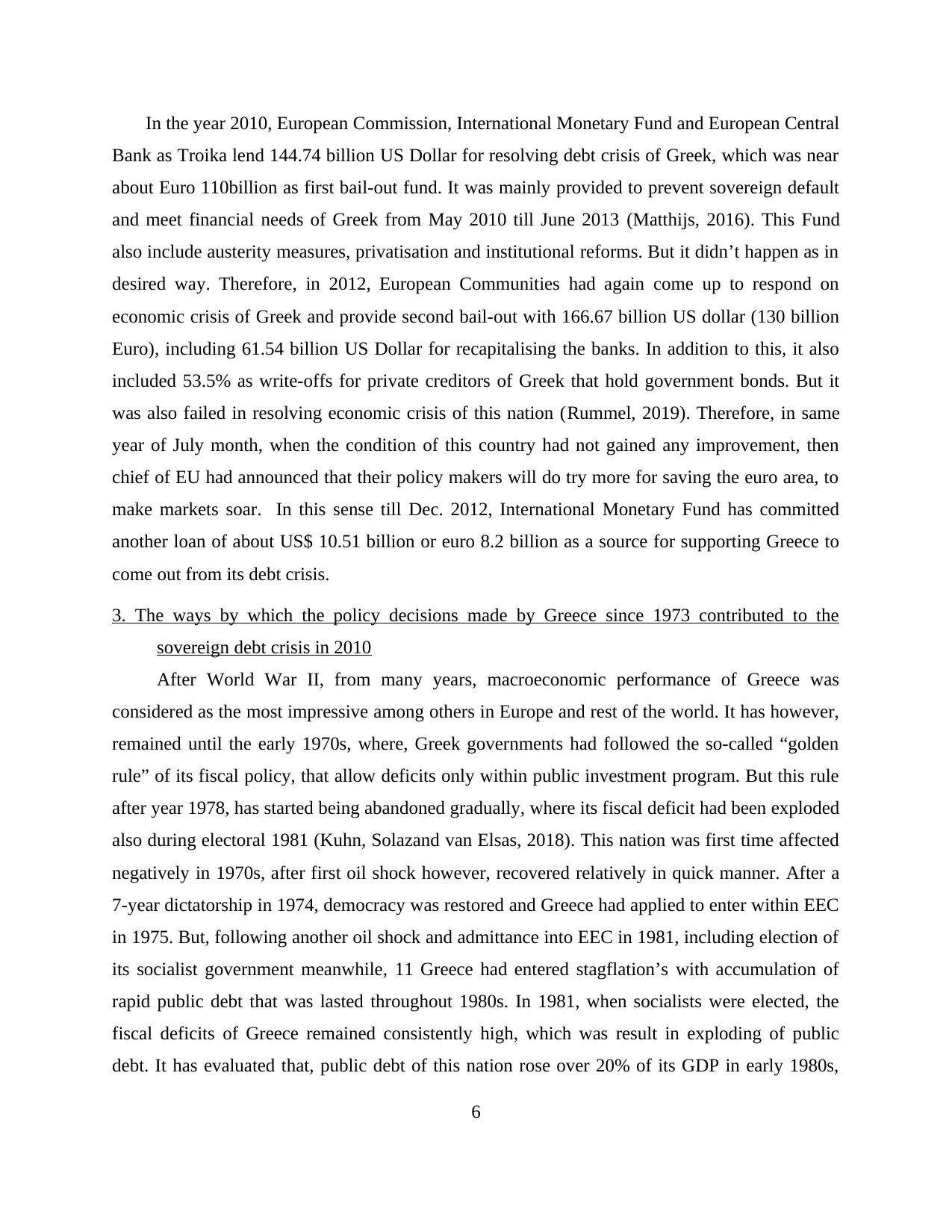
In the year 2010, European Commission, International Monetary Fund and European Central
Bank as Troika lend 144.74 billion US Dollar for resolving debt crisis of Greek, which was near
about Euro 110billion as first bail-out fund. It was mainly provided to prevent sovereign default
and meet financial needs of Greek from May 2010 till June 2013 (Matthijs, 2016). This Fund
also include austerity measures, privatisation and institutional reforms. But it didn’t happen as in
desired way. Therefore, in 2012, European Communities had again come up to respond on
economic crisis of Greek and provide second bail-out with 166.67 billion US dollar (130 billion
Euro), including 61.54 billion US Dollar for recapitalising the banks. In addition to this, it also
included 53.5% as write-offs for private creditors of Greek that hold government bonds. But it
was also failed in resolving economic crisis of this nation (Rummel, 2019). Therefore, in same
year of July month, when the condition of this country had not gained any improvement, then
chief of EU had announced that their policy makers will do try more for saving the euro area, to
make markets soar. In this sense till Dec. 2012, International Monetary Fund has committed
another loan of about US$ 10.51 billion or euro 8.2 billion as a source for supporting Greece to
come out from its debt crisis.
3. The ways by which the policy decisions made by Greece since 1973 contributed to the
sovereign debt crisis in 2010
After World War II, from many years, macroeconomic performance of Greece was
considered as the most impressive among others in Europe and rest of the world. It has however,
remained until the early 1970s, where, Greek governments had followed the so-called “golden
rule” of its fiscal policy, that allow deficits only within public investment program. But this rule
after year 1978, has started being abandoned gradually, where its fiscal deficit had been exploded
also during electoral 1981 (Kuhn, Solazand van Elsas, 2018). This nation was first time affected
negatively in 1970s, after first oil shock however, recovered relatively in quick manner. After a
7-year dictatorship in 1974, democracy was restored and Greece had applied to enter within EEC
in 1975. But, following another oil shock and admittance into EEC in 1981, including election of
its socialist government meanwhile, 11 Greece had entered stagflation’s with accumulation of
rapid public debt that was lasted throughout 1980s. In 1981, when socialists were elected, the
fiscal deficits of Greece remained consistently high, which was result in exploding of public
debt. It has evaluated that, public debt of this nation rose over 20% of its GDP in early 1980s,
6
Bank as Troika lend 144.74 billion US Dollar for resolving debt crisis of Greek, which was near
about Euro 110billion as first bail-out fund. It was mainly provided to prevent sovereign default
and meet financial needs of Greek from May 2010 till June 2013 (Matthijs, 2016). This Fund
also include austerity measures, privatisation and institutional reforms. But it didn’t happen as in
desired way. Therefore, in 2012, European Communities had again come up to respond on
economic crisis of Greek and provide second bail-out with 166.67 billion US dollar (130 billion
Euro), including 61.54 billion US Dollar for recapitalising the banks. In addition to this, it also
included 53.5% as write-offs for private creditors of Greek that hold government bonds. But it
was also failed in resolving economic crisis of this nation (Rummel, 2019). Therefore, in same
year of July month, when the condition of this country had not gained any improvement, then
chief of EU had announced that their policy makers will do try more for saving the euro area, to
make markets soar. In this sense till Dec. 2012, International Monetary Fund has committed
another loan of about US$ 10.51 billion or euro 8.2 billion as a source for supporting Greece to
come out from its debt crisis.
3. The ways by which the policy decisions made by Greece since 1973 contributed to the
sovereign debt crisis in 2010
After World War II, from many years, macroeconomic performance of Greece was
considered as the most impressive among others in Europe and rest of the world. It has however,
remained until the early 1970s, where, Greek governments had followed the so-called “golden
rule” of its fiscal policy, that allow deficits only within public investment program. But this rule
after year 1978, has started being abandoned gradually, where its fiscal deficit had been exploded
also during electoral 1981 (Kuhn, Solazand van Elsas, 2018). This nation was first time affected
negatively in 1970s, after first oil shock however, recovered relatively in quick manner. After a
7-year dictatorship in 1974, democracy was restored and Greece had applied to enter within EEC
in 1975. But, following another oil shock and admittance into EEC in 1981, including election of
its socialist government meanwhile, 11 Greece had entered stagflation’s with accumulation of
rapid public debt that was lasted throughout 1980s. In 1981, when socialists were elected, the
fiscal deficits of Greece remained consistently high, which was result in exploding of public
debt. It has evaluated that, public debt of this nation rose over 20% of its GDP in early 1980s,
6
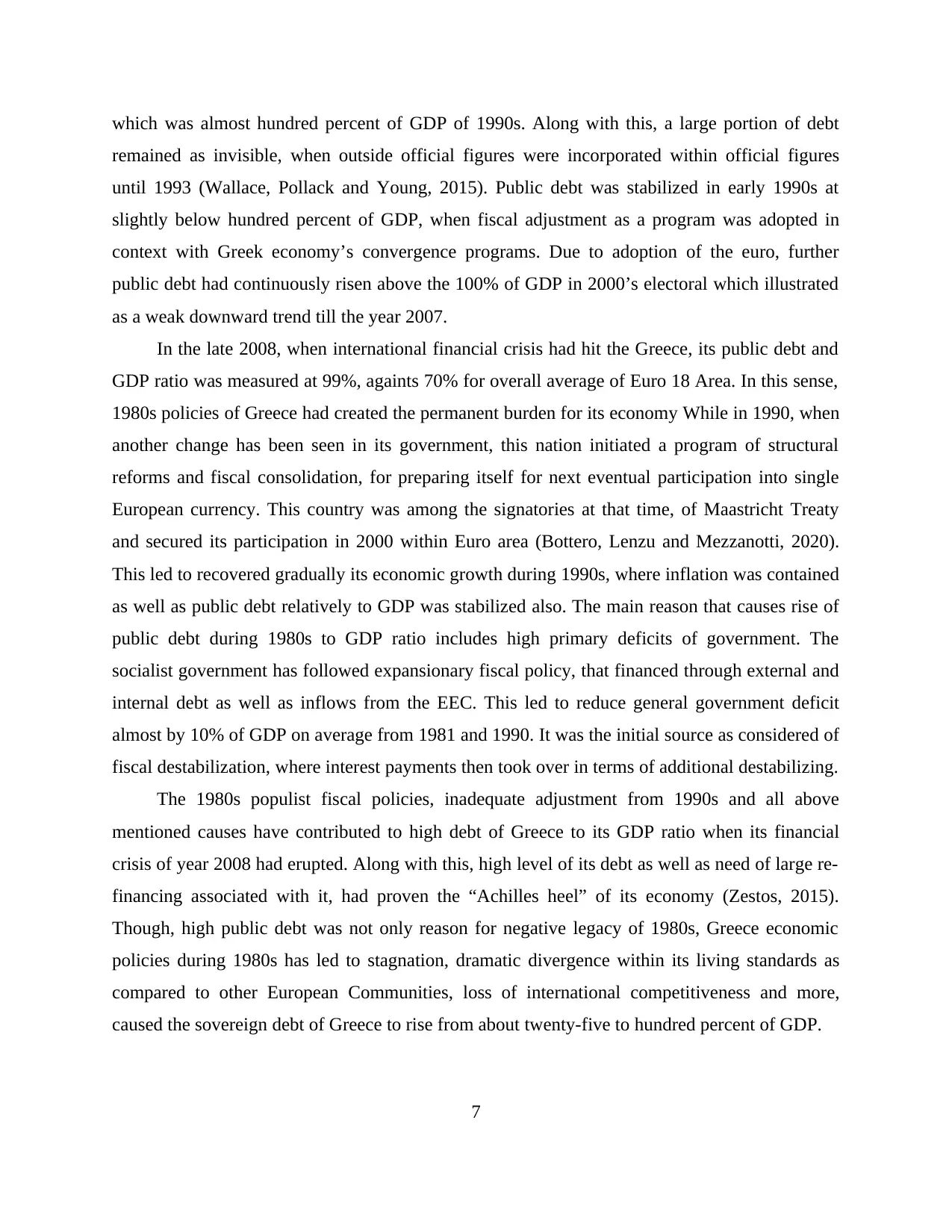
which was almost hundred percent of GDP of 1990s. Along with this, a large portion of debt
remained as invisible, when outside official figures were incorporated within official figures
until 1993 (Wallace, Pollack and Young, 2015). Public debt was stabilized in early 1990s at
slightly below hundred percent of GDP, when fiscal adjustment as a program was adopted in
context with Greek economy’s convergence programs. Due to adoption of the euro, further
public debt had continuously risen above the 100% of GDP in 2000’s electoral which illustrated
as a weak downward trend till the year 2007.
In the late 2008, when international financial crisis had hit the Greece, its public debt and
GDP ratio was measured at 99%, againts 70% for overall average of Euro 18 Area. In this sense,
1980s policies of Greece had created the permanent burden for its economy While in 1990, when
another change has been seen in its government, this nation initiated a program of structural
reforms and fiscal consolidation, for preparing itself for next eventual participation into single
European currency. This country was among the signatories at that time, of Maastricht Treaty
and secured its participation in 2000 within Euro area (Bottero, Lenzu and Mezzanotti, 2020).
This led to recovered gradually its economic growth during 1990s, where inflation was contained
as well as public debt relatively to GDP was stabilized also. The main reason that causes rise of
public debt during 1980s to GDP ratio includes high primary deficits of government. The
socialist government has followed expansionary fiscal policy, that financed through external and
internal debt as well as inflows from the EEC. This led to reduce general government deficit
almost by 10% of GDP on average from 1981 and 1990. It was the initial source as considered of
fiscal destabilization, where interest payments then took over in terms of additional destabilizing.
The 1980s populist fiscal policies, inadequate adjustment from 1990s and all above
mentioned causes have contributed to high debt of Greece to its GDP ratio when its financial
crisis of year 2008 had erupted. Along with this, high level of its debt as well as need of large re-
financing associated with it, had proven the “Achilles heel” of its economy (Zestos, 2015).
Though, high public debt was not only reason for negative legacy of 1980s, Greece economic
policies during 1980s has led to stagnation, dramatic divergence within its living standards as
compared to other European Communities, loss of international competitiveness and more,
caused the sovereign debt of Greece to rise from about twenty-five to hundred percent of GDP.
7
remained as invisible, when outside official figures were incorporated within official figures
until 1993 (Wallace, Pollack and Young, 2015). Public debt was stabilized in early 1990s at
slightly below hundred percent of GDP, when fiscal adjustment as a program was adopted in
context with Greek economy’s convergence programs. Due to adoption of the euro, further
public debt had continuously risen above the 100% of GDP in 2000’s electoral which illustrated
as a weak downward trend till the year 2007.
In the late 2008, when international financial crisis had hit the Greece, its public debt and
GDP ratio was measured at 99%, againts 70% for overall average of Euro 18 Area. In this sense,
1980s policies of Greece had created the permanent burden for its economy While in 1990, when
another change has been seen in its government, this nation initiated a program of structural
reforms and fiscal consolidation, for preparing itself for next eventual participation into single
European currency. This country was among the signatories at that time, of Maastricht Treaty
and secured its participation in 2000 within Euro area (Bottero, Lenzu and Mezzanotti, 2020).
This led to recovered gradually its economic growth during 1990s, where inflation was contained
as well as public debt relatively to GDP was stabilized also. The main reason that causes rise of
public debt during 1980s to GDP ratio includes high primary deficits of government. The
socialist government has followed expansionary fiscal policy, that financed through external and
internal debt as well as inflows from the EEC. This led to reduce general government deficit
almost by 10% of GDP on average from 1981 and 1990. It was the initial source as considered of
fiscal destabilization, where interest payments then took over in terms of additional destabilizing.
The 1980s populist fiscal policies, inadequate adjustment from 1990s and all above
mentioned causes have contributed to high debt of Greece to its GDP ratio when its financial
crisis of year 2008 had erupted. Along with this, high level of its debt as well as need of large re-
financing associated with it, had proven the “Achilles heel” of its economy (Zestos, 2015).
Though, high public debt was not only reason for negative legacy of 1980s, Greece economic
policies during 1980s has led to stagnation, dramatic divergence within its living standards as
compared to other European Communities, loss of international competitiveness and more,
caused the sovereign debt of Greece to rise from about twenty-five to hundred percent of GDP.
7
Paraphrase This Document
Need a fresh take? Get an instant paraphrase of this document with our AI Paraphraser
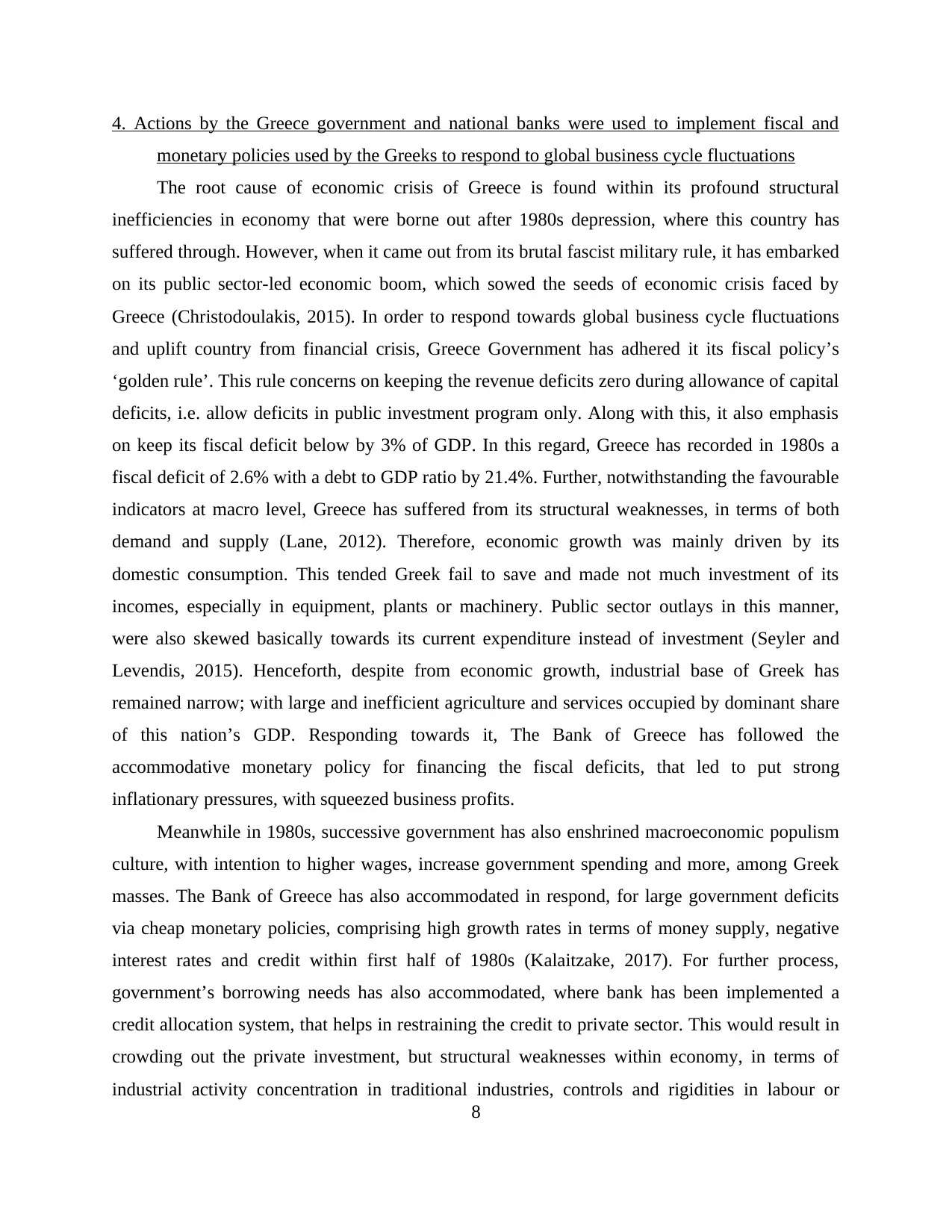
4. Actions by the Greece government and national banks were used to implement fiscal and
monetary policies used by the Greeks to respond to global business cycle fluctuations
The root cause of economic crisis of Greece is found within its profound structural
inefficiencies in economy that were borne out after 1980s depression, where this country has
suffered through. However, when it came out from its brutal fascist military rule, it has embarked
on its public sector-led economic boom, which sowed the seeds of economic crisis faced by
Greece (Christodoulakis, 2015). In order to respond towards global business cycle fluctuations
and uplift country from financial crisis, Greece Government has adhered it its fiscal policy’s
‘golden rule’. This rule concerns on keeping the revenue deficits zero during allowance of capital
deficits, i.e. allow deficits in public investment program only. Along with this, it also emphasis
on keep its fiscal deficit below by 3% of GDP. In this regard, Greece has recorded in 1980s a
fiscal deficit of 2.6% with a debt to GDP ratio by 21.4%. Further, notwithstanding the favourable
indicators at macro level, Greece has suffered from its structural weaknesses, in terms of both
demand and supply (Lane, 2012). Therefore, economic growth was mainly driven by its
domestic consumption. This tended Greek fail to save and made not much investment of its
incomes, especially in equipment, plants or machinery. Public sector outlays in this manner,
were also skewed basically towards its current expenditure instead of investment (Seyler and
Levendis, 2015). Henceforth, despite from economic growth, industrial base of Greek has
remained narrow; with large and inefficient agriculture and services occupied by dominant share
of this nation’s GDP. Responding towards it, The Bank of Greece has followed the
accommodative monetary policy for financing the fiscal deficits, that led to put strong
inflationary pressures, with squeezed business profits.
Meanwhile in 1980s, successive government has also enshrined macroeconomic populism
culture, with intention to higher wages, increase government spending and more, among Greek
masses. The Bank of Greece has also accommodated in respond, for large government deficits
via cheap monetary policies, comprising high growth rates in terms of money supply, negative
interest rates and credit within first half of 1980s (Kalaitzake, 2017). For further process,
government’s borrowing needs has also accommodated, where bank has been implemented a
credit allocation system, that helps in restraining the credit to private sector. This would result in
crowding out the private investment, but structural weaknesses within economy, in terms of
industrial activity concentration in traditional industries, controls and rigidities in labour or
8
monetary policies used by the Greeks to respond to global business cycle fluctuations
The root cause of economic crisis of Greece is found within its profound structural
inefficiencies in economy that were borne out after 1980s depression, where this country has
suffered through. However, when it came out from its brutal fascist military rule, it has embarked
on its public sector-led economic boom, which sowed the seeds of economic crisis faced by
Greece (Christodoulakis, 2015). In order to respond towards global business cycle fluctuations
and uplift country from financial crisis, Greece Government has adhered it its fiscal policy’s
‘golden rule’. This rule concerns on keeping the revenue deficits zero during allowance of capital
deficits, i.e. allow deficits in public investment program only. Along with this, it also emphasis
on keep its fiscal deficit below by 3% of GDP. In this regard, Greece has recorded in 1980s a
fiscal deficit of 2.6% with a debt to GDP ratio by 21.4%. Further, notwithstanding the favourable
indicators at macro level, Greece has suffered from its structural weaknesses, in terms of both
demand and supply (Lane, 2012). Therefore, economic growth was mainly driven by its
domestic consumption. This tended Greek fail to save and made not much investment of its
incomes, especially in equipment, plants or machinery. Public sector outlays in this manner,
were also skewed basically towards its current expenditure instead of investment (Seyler and
Levendis, 2015). Henceforth, despite from economic growth, industrial base of Greek has
remained narrow; with large and inefficient agriculture and services occupied by dominant share
of this nation’s GDP. Responding towards it, The Bank of Greece has followed the
accommodative monetary policy for financing the fiscal deficits, that led to put strong
inflationary pressures, with squeezed business profits.
Meanwhile in 1980s, successive government has also enshrined macroeconomic populism
culture, with intention to higher wages, increase government spending and more, among Greek
masses. The Bank of Greece has also accommodated in respond, for large government deficits
via cheap monetary policies, comprising high growth rates in terms of money supply, negative
interest rates and credit within first half of 1980s (Kalaitzake, 2017). For further process,
government’s borrowing needs has also accommodated, where bank has been implemented a
credit allocation system, that helps in restraining the credit to private sector. This would result in
crowding out the private investment, but structural weaknesses within economy, in terms of
industrial activity concentration in traditional industries, controls and rigidities in labour or
8
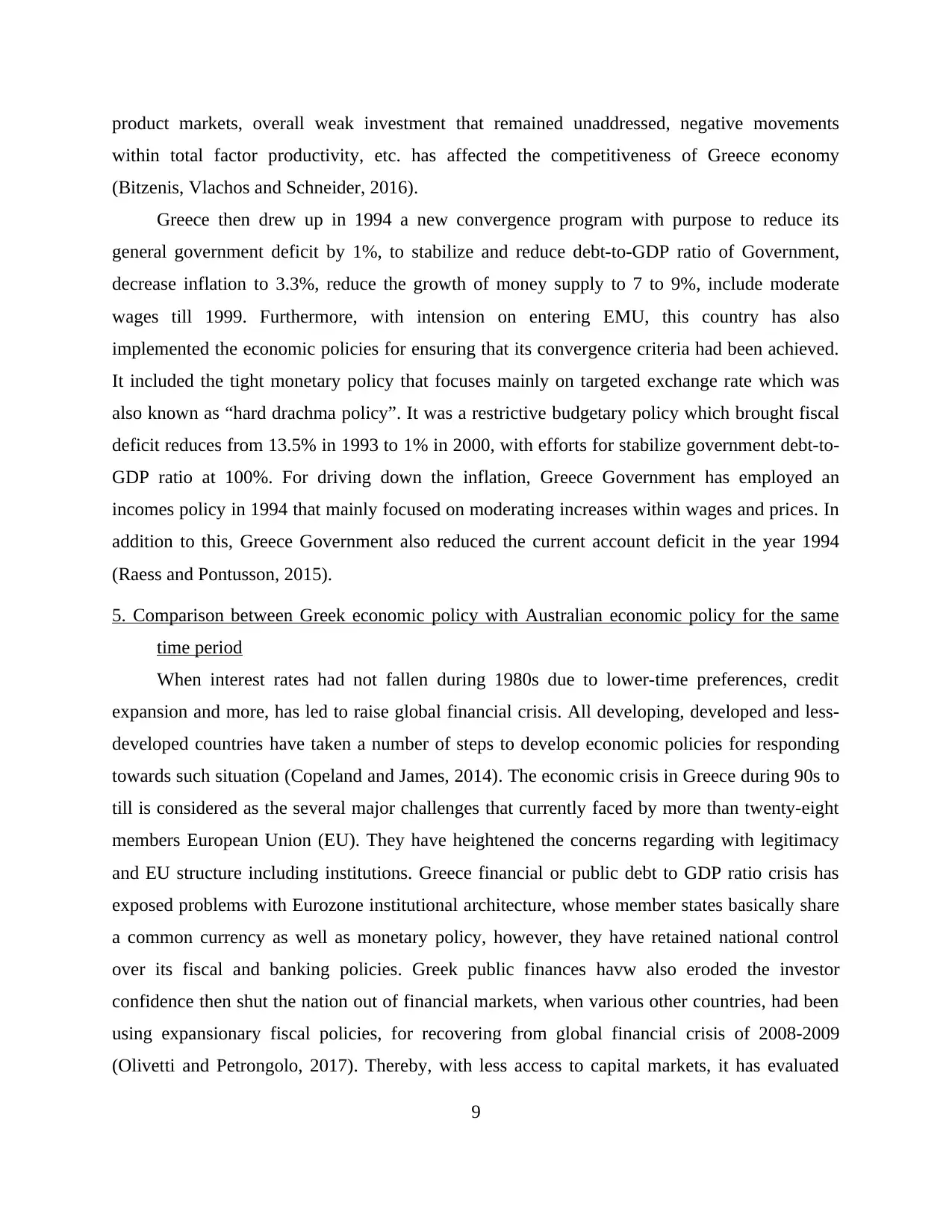
product markets, overall weak investment that remained unaddressed, negative movements
within total factor productivity, etc. has affected the competitiveness of Greece economy
(Bitzenis, Vlachos and Schneider, 2016).
Greece then drew up in 1994 a new convergence program with purpose to reduce its
general government deficit by 1%, to stabilize and reduce debt-to-GDP ratio of Government,
decrease inflation to 3.3%, reduce the growth of money supply to 7 to 9%, include moderate
wages till 1999. Furthermore, with intension on entering EMU, this country has also
implemented the economic policies for ensuring that its convergence criteria had been achieved.
It included the tight monetary policy that focuses mainly on targeted exchange rate which was
also known as “hard drachma policy”. It was a restrictive budgetary policy which brought fiscal
deficit reduces from 13.5% in 1993 to 1% in 2000, with efforts for stabilize government debt-to-
GDP ratio at 100%. For driving down the inflation, Greece Government has employed an
incomes policy in 1994 that mainly focused on moderating increases within wages and prices. In
addition to this, Greece Government also reduced the current account deficit in the year 1994
(Raess and Pontusson, 2015).
5. Comparison between Greek economic policy with Australian economic policy for the same
time period
When interest rates had not fallen during 1980s due to lower-time preferences, credit
expansion and more, has led to raise global financial crisis. All developing, developed and less-
developed countries have taken a number of steps to develop economic policies for responding
towards such situation (Copeland and James, 2014). The economic crisis in Greece during 90s to
till is considered as the several major challenges that currently faced by more than twenty-eight
members European Union (EU). They have heightened the concerns regarding with legitimacy
and EU structure including institutions. Greece financial or public debt to GDP ratio crisis has
exposed problems with Eurozone institutional architecture, whose member states basically share
a common currency as well as monetary policy, however, they have retained national control
over its fiscal and banking policies. Greek public finances havw also eroded the investor
confidence then shut the nation out of financial markets, when various other countries, had been
using expansionary fiscal policies, for recovering from global financial crisis of 2008-2009
(Olivetti and Petrongolo, 2017). Thereby, with less access to capital markets, it has evaluated
9
within total factor productivity, etc. has affected the competitiveness of Greece economy
(Bitzenis, Vlachos and Schneider, 2016).
Greece then drew up in 1994 a new convergence program with purpose to reduce its
general government deficit by 1%, to stabilize and reduce debt-to-GDP ratio of Government,
decrease inflation to 3.3%, reduce the growth of money supply to 7 to 9%, include moderate
wages till 1999. Furthermore, with intension on entering EMU, this country has also
implemented the economic policies for ensuring that its convergence criteria had been achieved.
It included the tight monetary policy that focuses mainly on targeted exchange rate which was
also known as “hard drachma policy”. It was a restrictive budgetary policy which brought fiscal
deficit reduces from 13.5% in 1993 to 1% in 2000, with efforts for stabilize government debt-to-
GDP ratio at 100%. For driving down the inflation, Greece Government has employed an
incomes policy in 1994 that mainly focused on moderating increases within wages and prices. In
addition to this, Greece Government also reduced the current account deficit in the year 1994
(Raess and Pontusson, 2015).
5. Comparison between Greek economic policy with Australian economic policy for the same
time period
When interest rates had not fallen during 1980s due to lower-time preferences, credit
expansion and more, has led to raise global financial crisis. All developing, developed and less-
developed countries have taken a number of steps to develop economic policies for responding
towards such situation (Copeland and James, 2014). The economic crisis in Greece during 90s to
till is considered as the several major challenges that currently faced by more than twenty-eight
members European Union (EU). They have heightened the concerns regarding with legitimacy
and EU structure including institutions. Greece financial or public debt to GDP ratio crisis has
exposed problems with Eurozone institutional architecture, whose member states basically share
a common currency as well as monetary policy, however, they have retained national control
over its fiscal and banking policies. Greek public finances havw also eroded the investor
confidence then shut the nation out of financial markets, when various other countries, had been
using expansionary fiscal policies, for recovering from global financial crisis of 2008-2009
(Olivetti and Petrongolo, 2017). Thereby, with less access to capital markets, it has evaluated
9
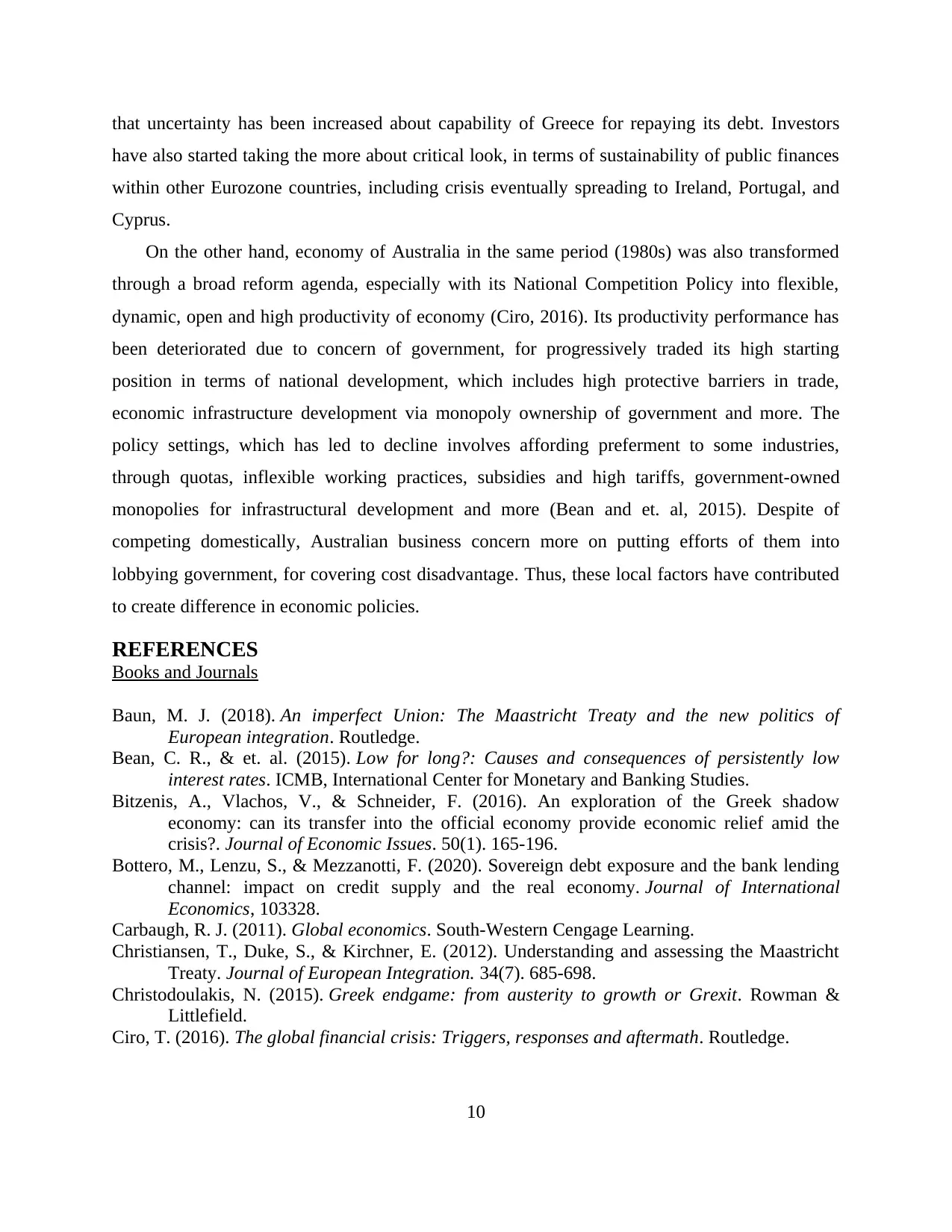
that uncertainty has been increased about capability of Greece for repaying its debt. Investors
have also started taking the more about critical look, in terms of sustainability of public finances
within other Eurozone countries, including crisis eventually spreading to Ireland, Portugal, and
Cyprus.
On the other hand, economy of Australia in the same period (1980s) was also transformed
through a broad reform agenda, especially with its National Competition Policy into flexible,
dynamic, open and high productivity of economy (Ciro, 2016). Its productivity performance has
been deteriorated due to concern of government, for progressively traded its high starting
position in terms of national development, which includes high protective barriers in trade,
economic infrastructure development via monopoly ownership of government and more. The
policy settings, which has led to decline involves affording preferment to some industries,
through quotas, inflexible working practices, subsidies and high tariffs, government-owned
monopolies for infrastructural development and more (Bean and et. al, 2015). Despite of
competing domestically, Australian business concern more on putting efforts of them into
lobbying government, for covering cost disadvantage. Thus, these local factors have contributed
to create difference in economic policies.
REFERENCES
Books and Journals
Baun, M. J. (2018). An imperfect Union: The Maastricht Treaty and the new politics of
European integration. Routledge.
Bean, C. R., & et. al. (2015). Low for long?: Causes and consequences of persistently low
interest rates. ICMB, International Center for Monetary and Banking Studies.
Bitzenis, A., Vlachos, V., & Schneider, F. (2016). An exploration of the Greek shadow
economy: can its transfer into the official economy provide economic relief amid the
crisis?. Journal of Economic Issues. 50(1). 165-196.
Bottero, M., Lenzu, S., & Mezzanotti, F. (2020). Sovereign debt exposure and the bank lending
channel: impact on credit supply and the real economy. Journal of International
Economics, 103328.
Carbaugh, R. J. (2011). Global economics. South-Western Cengage Learning.
Christiansen, T., Duke, S., & Kirchner, E. (2012). Understanding and assessing the Maastricht
Treaty. Journal of European Integration. 34(7). 685-698.
Christodoulakis, N. (2015). Greek endgame: from austerity to growth or Grexit. Rowman &
Littlefield.
Ciro, T. (2016). The global financial crisis: Triggers, responses and aftermath. Routledge.
10
have also started taking the more about critical look, in terms of sustainability of public finances
within other Eurozone countries, including crisis eventually spreading to Ireland, Portugal, and
Cyprus.
On the other hand, economy of Australia in the same period (1980s) was also transformed
through a broad reform agenda, especially with its National Competition Policy into flexible,
dynamic, open and high productivity of economy (Ciro, 2016). Its productivity performance has
been deteriorated due to concern of government, for progressively traded its high starting
position in terms of national development, which includes high protective barriers in trade,
economic infrastructure development via monopoly ownership of government and more. The
policy settings, which has led to decline involves affording preferment to some industries,
through quotas, inflexible working practices, subsidies and high tariffs, government-owned
monopolies for infrastructural development and more (Bean and et. al, 2015). Despite of
competing domestically, Australian business concern more on putting efforts of them into
lobbying government, for covering cost disadvantage. Thus, these local factors have contributed
to create difference in economic policies.
REFERENCES
Books and Journals
Baun, M. J. (2018). An imperfect Union: The Maastricht Treaty and the new politics of
European integration. Routledge.
Bean, C. R., & et. al. (2015). Low for long?: Causes and consequences of persistently low
interest rates. ICMB, International Center for Monetary and Banking Studies.
Bitzenis, A., Vlachos, V., & Schneider, F. (2016). An exploration of the Greek shadow
economy: can its transfer into the official economy provide economic relief amid the
crisis?. Journal of Economic Issues. 50(1). 165-196.
Bottero, M., Lenzu, S., & Mezzanotti, F. (2020). Sovereign debt exposure and the bank lending
channel: impact on credit supply and the real economy. Journal of International
Economics, 103328.
Carbaugh, R. J. (2011). Global economics. South-Western Cengage Learning.
Christiansen, T., Duke, S., & Kirchner, E. (2012). Understanding and assessing the Maastricht
Treaty. Journal of European Integration. 34(7). 685-698.
Christodoulakis, N. (2015). Greek endgame: from austerity to growth or Grexit. Rowman &
Littlefield.
Ciro, T. (2016). The global financial crisis: Triggers, responses and aftermath. Routledge.
10
Secure Best Marks with AI Grader
Need help grading? Try our AI Grader for instant feedback on your assignments.
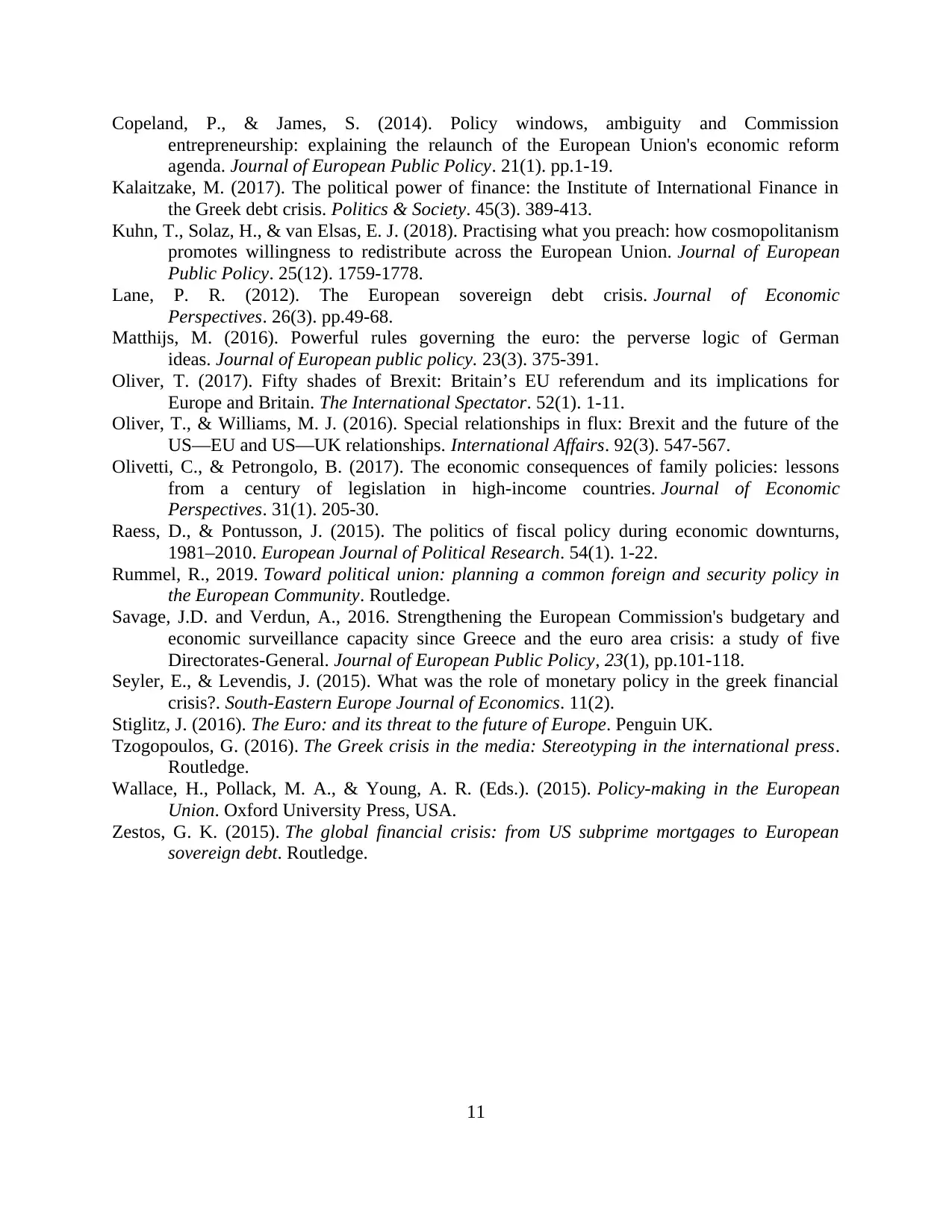
Copeland, P., & James, S. (2014). Policy windows, ambiguity and Commission
entrepreneurship: explaining the relaunch of the European Union's economic reform
agenda. Journal of European Public Policy. 21(1). pp.1-19.
Kalaitzake, M. (2017). The political power of finance: the Institute of International Finance in
the Greek debt crisis. Politics & Society. 45(3). 389-413.
Kuhn, T., Solaz, H., & van Elsas, E. J. (2018). Practising what you preach: how cosmopolitanism
promotes willingness to redistribute across the European Union. Journal of European
Public Policy. 25(12). 1759-1778.
Lane, P. R. (2012). The European sovereign debt crisis. Journal of Economic
Perspectives. 26(3). pp.49-68.
Matthijs, M. (2016). Powerful rules governing the euro: the perverse logic of German
ideas. Journal of European public policy. 23(3). 375-391.
Oliver, T. (2017). Fifty shades of Brexit: Britain’s EU referendum and its implications for
Europe and Britain. The International Spectator. 52(1). 1-11.
Oliver, T., & Williams, M. J. (2016). Special relationships in flux: Brexit and the future of the
US—EU and US—UK relationships. International Affairs. 92(3). 547-567.
Olivetti, C., & Petrongolo, B. (2017). The economic consequences of family policies: lessons
from a century of legislation in high-income countries. Journal of Economic
Perspectives. 31(1). 205-30.
Raess, D., & Pontusson, J. (2015). The politics of fiscal policy during economic downturns,
1981–2010. European Journal of Political Research. 54(1). 1-22.
Rummel, R., 2019. Toward political union: planning a common foreign and security policy in
the European Community. Routledge.
Savage, J.D. and Verdun, A., 2016. Strengthening the European Commission's budgetary and
economic surveillance capacity since Greece and the euro area crisis: a study of five
Directorates-General. Journal of European Public Policy, 23(1), pp.101-118.
Seyler, E., & Levendis, J. (2015). What was the role of monetary policy in the greek financial
crisis?. South-Eastern Europe Journal of Economics. 11(2).
Stiglitz, J. (2016). The Euro: and its threat to the future of Europe. Penguin UK.
Tzogopoulos, G. (2016). The Greek crisis in the media: Stereotyping in the international press.
Routledge.
Wallace, H., Pollack, M. A., & Young, A. R. (Eds.). (2015). Policy-making in the European
Union. Oxford University Press, USA.
Zestos, G. K. (2015). The global financial crisis: from US subprime mortgages to European
sovereign debt. Routledge.
11
entrepreneurship: explaining the relaunch of the European Union's economic reform
agenda. Journal of European Public Policy. 21(1). pp.1-19.
Kalaitzake, M. (2017). The political power of finance: the Institute of International Finance in
the Greek debt crisis. Politics & Society. 45(3). 389-413.
Kuhn, T., Solaz, H., & van Elsas, E. J. (2018). Practising what you preach: how cosmopolitanism
promotes willingness to redistribute across the European Union. Journal of European
Public Policy. 25(12). 1759-1778.
Lane, P. R. (2012). The European sovereign debt crisis. Journal of Economic
Perspectives. 26(3). pp.49-68.
Matthijs, M. (2016). Powerful rules governing the euro: the perverse logic of German
ideas. Journal of European public policy. 23(3). 375-391.
Oliver, T. (2017). Fifty shades of Brexit: Britain’s EU referendum and its implications for
Europe and Britain. The International Spectator. 52(1). 1-11.
Oliver, T., & Williams, M. J. (2016). Special relationships in flux: Brexit and the future of the
US—EU and US—UK relationships. International Affairs. 92(3). 547-567.
Olivetti, C., & Petrongolo, B. (2017). The economic consequences of family policies: lessons
from a century of legislation in high-income countries. Journal of Economic
Perspectives. 31(1). 205-30.
Raess, D., & Pontusson, J. (2015). The politics of fiscal policy during economic downturns,
1981–2010. European Journal of Political Research. 54(1). 1-22.
Rummel, R., 2019. Toward political union: planning a common foreign and security policy in
the European Community. Routledge.
Savage, J.D. and Verdun, A., 2016. Strengthening the European Commission's budgetary and
economic surveillance capacity since Greece and the euro area crisis: a study of five
Directorates-General. Journal of European Public Policy, 23(1), pp.101-118.
Seyler, E., & Levendis, J. (2015). What was the role of monetary policy in the greek financial
crisis?. South-Eastern Europe Journal of Economics. 11(2).
Stiglitz, J. (2016). The Euro: and its threat to the future of Europe. Penguin UK.
Tzogopoulos, G. (2016). The Greek crisis in the media: Stereotyping in the international press.
Routledge.
Wallace, H., Pollack, M. A., & Young, A. R. (Eds.). (2015). Policy-making in the European
Union. Oxford University Press, USA.
Zestos, G. K. (2015). The global financial crisis: from US subprime mortgages to European
sovereign debt. Routledge.
11
1 out of 11
Related Documents
Your All-in-One AI-Powered Toolkit for Academic Success.
+13062052269
info@desklib.com
Available 24*7 on WhatsApp / Email
![[object Object]](/_next/static/media/star-bottom.7253800d.svg)
Unlock your academic potential
© 2024 | Zucol Services PVT LTD | All rights reserved.





